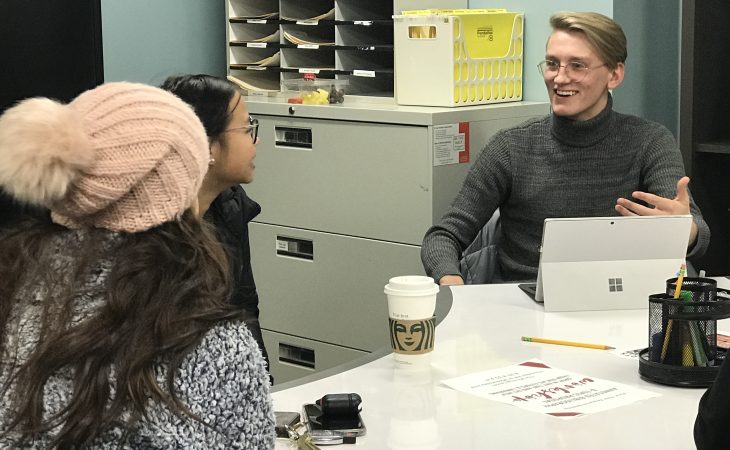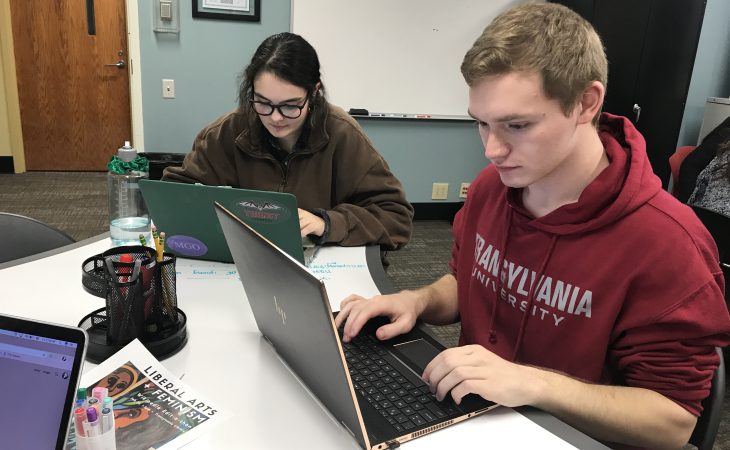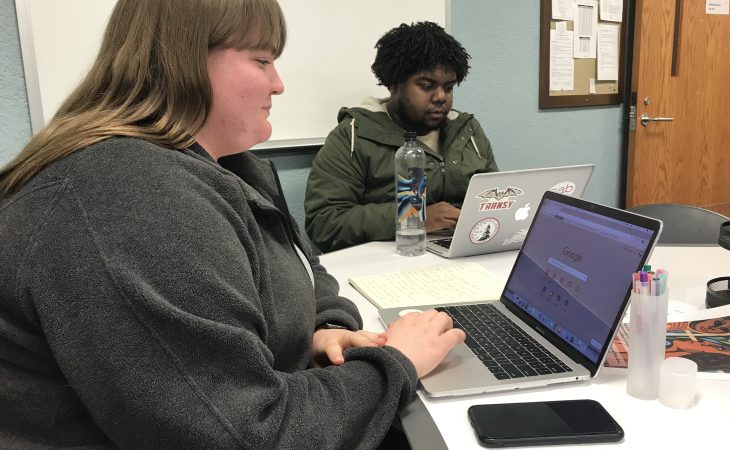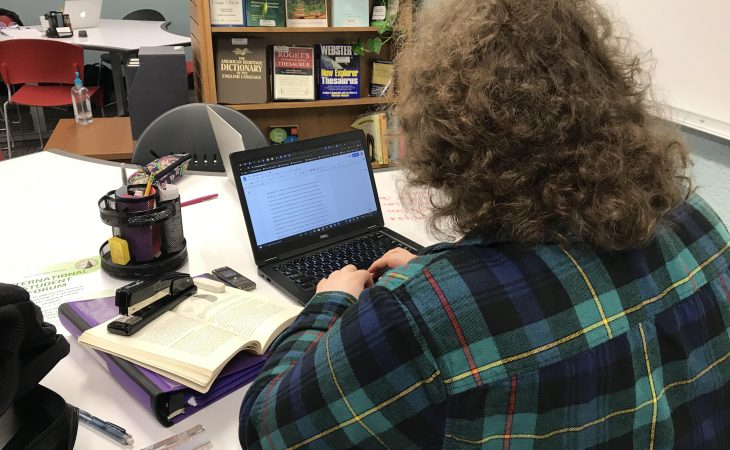TU-Peer Writing Tutor Alumni Research Project
Writing Center alums reflect on their experiences
In 2019, Transylvania University’s Writing Center (TUWC) were interested in learning more about their alums. As part of this process, we reviewed Bradley Hughes, Paula Gillespie and Harvey Kail’s “What They Take with Them: Findings from the Peer Writing Tutor Alumni Research Project,” or PWTARP. This project, which explored the impact of tutoring on tutors themselves, was insightful, especially as each of us was preparing to begin our time as on-campus tutors. We learned that tutoring would impact us in a variety of ways, including the development of personal and professional skills, a new relationship with writing, and an interest in collaboration.
Still, in discussing PWTARP, we recognized that something was missing. Hughes, Gillespie, and Kail had only focused on large universities, a category that did not include Transylvania University. Could it be different for a small, liberal arts college? We decided to find out by replicating PWTARP. We corresponded with 56 alums of Transylvania University’s Writing Center, sending them each a survey with both questions from the original as well as new questions, which were intended to provide data pertaining to the specific impact of Transylvania University on their experiences. We then coded these responses to identify three common themes, which aligned with the original study, as well as an additional theme: TU Extra. Our version of this study, then, showcases the unique and distinctive nature of the small, liberal arts experience. We discovered that TUWC alums were greatly impacted by their experience as staffers, especially within their personal, professional, and civic lives. Below, you will find some results.
A New Relationship With Writing
To supplement our numerical research, the PWTARP survey gave us the opportunity to hear back from our alums through short-answer, narrative based questions. Similarly to the original PWTARP study, many of our respondents’ written sentiments indicated a new or altered relationship with writing as a result of having worked so intimately with the writing of others.

For many of our respondents, a new relationship with writing can begin with a new relationship to the feedback or criticism of others. As one puts it, “I have learned not to be too attached to my own writing and to welcome feedback.” Another: “I’ve learned how to be patient, ask the right questions to see what writers intend to say, give constructive feedback, and walk through my suggested edits in a collaborative way.”
The second main thread we can gather from our respondents’ new relationship with writing is a gained perception of its limitlessness. For many respondents, Writing Center work allowed them to explore writing processes outside of their own: “Being exposed to a number of different writing styles and seeing those styles develop in my repeat clients gave me ideas for how my writing could change or grow as well.”
I gained confidence in my own voice by helping other students to find theirs
And in this new perspective can come an earned confidence in this expanded set of skills and options for writing: “When I was invited to be a writing center tutor, I thought that the center had lost [its] mind. I was sure I was totally unqualified. But I gained confidence in my own voice by helping other students to find theirs. I can’t tell you how rewarding that was for me as a young person, and how much I still draw on that confidence every day.”
Skills, Values and Abilities

Another result we found from the TU-PWTARP was that tutors are adept in translating skills they attained through working in the Writing Center into their personal and professional lives. For example, one alum wrote: “I teach writing-intensive courses now and I had a distinct edge on my cohort since I had some instruction in writing feedback as a writing tutor. It helped me write effective assignments, anticipating the types of struggles students might encounter, and as I had an opportunity to work with the writing center director, I had a lot of ideas at the ready.” Another told us that “being able to take my pre-medical, biology-studying self down to the humanities building and explore some poetry and journalism classes and be involved with the newspaper and the writing center was a huge part of keeping me both grounded and well-rounded, and certainly made me a better doctor, as I practiced my empathy and ability to educate in that space.”
Furthermore, respondents told us that the quality of their relationships with their colleagues, friends, and family have been influenced by the skills they practiced as Writing Center tutors. One alum said: “In particular, I can interact with people much more calmly and empathetically, something I struggled with in college and still do struggle with on occasion. I have very strong political beliefs, which can alienate me from people, but working in the
I think I’m a more effective partner, friend and family member because I pay closer attention to how my writing/words will be understood, as opposed to just how I intended them.
writing center has given me the tools to work with people and interact with them even if we strongly disagree.” Another former tutor reflected on their developed emotional awareness: “I think I’m a more effective partner, friend, and family member because I pay closer attention to how my writing/words will be understood, as opposed to just how I intended them.”
Collaboration

In reviewing the results from our version of the PWTARP study, the effect that peer tutoring in the TU Writing Center had on its staffers became obvious: staffers left the Writing Center with a heightened appreciation for collaboration, oftentimes translating this change into their post-graduate lives. One past tutor learned that “writing, while incredibly personal, is also a collaborative thing” (4) and reports that they are now more open to receiving feedback on their work from others. This same tutor, who went on to become an educator, when asked how their time as a staffer affected their post-graduate life, responds: “I constantly approach my own teaching as a collaboration, rather than viewing myself as the one who holds all of the knowledge” (4). Another insists that they “grew to value the creativity, and simply stronger work, that grew out of collaborative writing.”
Whether it be in tutors’ personal or professional lives, it is evident that Writing Center work
I am a stronger writer because I work more collaboratively, which in general has made me a stronger team player than I would have been without TUWC experience.
fosters a commitment to collaborative learning that follows tutors far past their graduation date. One past tutor expresses this trend best when they say, “I am a stronger writer because I work more collaboratively, which in general has made me a stronger team player than I would’ve been without TUWC experience.”
The Transy Extra

What particularly distinguishes our findings from those of the original PWTARP is the category of responses we have fondly come to refer to as the “Transy Extra”: what, if anything, about Transylvania specifically affects the experience of writing tutors, while at Transylvania and beyond? In our survey, we added questions that specifically sought to investigate both how the small size and liberal arts curriculum of our university may have affected the Writing Center experience. Some respondents spoke of how the small size of Transylvania’s student population affected their experience as students and writing tutors. Many of our writing center alumni wrote that the small size of the school led to building better, stronger, more productive relationships with peers in the Writing Center. One alum wrote: “Transy’s size permitted the collaborative nature of the WC process to extend outside of WC hours. For example, if I had recurring appointments with colleagues who I knew well, we would often discuss things outside of hours.”
…working in a wide range of different disciplines allowed me to be flexible and open minded enough to be comfortably able to approach basically anything.
The bigger trend throughout these answers, however, was the notion that Transylvania’s liberal-arts, cross-discipline curriculum had a substantial impact on the way Writing Center staffers learned and worked at Transylvania and lived and worked beyond graduation. We asked our respondents to list their extracurricular activities –they ranged from things you would expect, like writing for our school newspaper, to things you might not, like math tutoring or being a first-chair oboist. Their areas of study were varied as well. Disciplines all across the board–from classics to chemistry, sociology to studio art, anthropology to accounting–were represented in former Writing Center staffers. Our respondents reported that the diversity of their own studies, and the diversity of classes they were required and encouraged to take through Transy’s liberal arts curriculum, as well as the areas they encountered through the work of writing center patrons, allowed them to further develop the
Writing Center skills that have served them at Transy and far beyond.